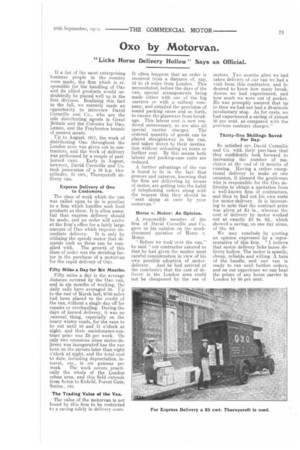Oxo by /Yiotorvan.
Page 15

If you've noticed an error in this article please click here to report it so we can fix it.
"Licks Horse Delivery Hollow" Says an Official.
. If a list of the most enterprising business people in the country were made, the firm which is responsible for the handling of Oxo and its allied products would undoubtedly be placed well up in the first division. Realizing this fact to the full, we recently made an opportunity to interview David Corneille and Co., who are the sole distributing agents in Great Britain and the Colonies for Oxo, Lemco, and the Fraybentos brands of canned meats.
Up to August, 1911, the work of distributing Oxo throughout the London area was given out to contractors, and the work of delivery was performed by a couple of pairhorsed vans. Early in August, however, David Corneille and Co. took possession of a 16 h.p. twocylinder, 23 cwt., Thornycroft delivery van.
Express Delivery of Oxo to Customers.
The class of work which the van was called upon to do is peculiar to a firm which handles such food products as these. It is often essential that express delivery should be made, and an order will arrive at the firm's office for a fairly large amount of Oxo which requires immediate delivery. It is only by utilizing the speedy motor that demands such as these can be com
plied with. The growth of this class of order was the deciding factor in the purchase of a niotorvan for the rapid delivery of Oxo.
Fifty Miles a Day for Six Months.
Fifty miles a day is the average distance covered by the Oxo van, and in six months of working, the daily calls have averaged 55. Up to the end of March last, 9700 miles had been placed to the credit of the van, without a single day off for repairs or overhauling. During the days of horsed delivery, it was no unusual thing, especially on the heavy winter roads, for the vans to be out until 10 and 11 o'clock at night, and their maintenance-contract price was f.) per week. On only two occasions since motor-delivery was inaugurated has the van been on the streets later than eight o'clock at night., and the total cost to date, including depreciation, interest, etc., is six guineas per week. The work covers practically the whole of the London urban area., and this field extends from. eitton to Enfield, Forest Gate, Suttoi., etc.
The Trading Value of the Van.
The value of the motorvan is not found by this firm to be restricted to a saving solely in delivery costs. It often happens that an order is received from a distance of, say, 12 to 16 miles from London. This necessitated, before the days of the van, special arrangements being made either with one of the big carriers or with a railway company, and entailed the provision of sound packing cases and so forth, to ensure the glassware from breakage. This labour cost is now rendered unnecessary, as are also all special carrier charges. The ordered quantity of goods can be placed straightaway in the van, and taken direct to their destination without unloading en route or further cost. By this means both labour and packing-case costs are reduced.
A further advantage of the van is found to lie in the fact that grocers and caterers, knowing that the firm are delivering by means of motor, are getting into the habit of telephoning orders along with the request that they should be "sent along at once by your inotorvan."
Horse v. Motor: An Opinion.
A responsible member of the firm of David Corneille and Co. gave us his opinion on the muchdiscussed question of Horse v. Motor.
" Before we took over the van," he said "our contractor assured us that he had given the matter most careful consideration in view of his own possible adoption of motordelivery. And he had arrived at the conclusion that the cost of delivery in the London area could not be cheapened by the use of
motors. TR() months after we had taken delivery of our van we had a visit from this contractor, and he desired to know how many breakdowns we had experienced, and how much we were out of pocket. He was promptly assured that up to then we had not had a 20-minute involuntary stop. As for costs, we had experienced a saving of almost 50 per cent. as compared with the previous contract charges."
Thirty-five Shillings Saved Per Day.
So satisfied are David Corneille and Co. with their purc hase that they confidently look forward to increasing the number of machines at the end of 12 months of running. Having a rather exceptional delivery to make on one occasion, it pleased the gentleman who is responsible for the Oxo deliveries to obtain a quotation from a well-known firm of contractors, and then to fmd out his own costs for motor-delivery. It is interesting to note that the contract price was given at 24 3s., whereas the cost of delivery by motor worked out at exactly £2 8s. 6d., which showed a saving, on one day alone, of 35s. 6d.
We may conclude by quoting an opinion expressed by a representative of this firm. "I believe that motor delivery licks horse delivery hollow. The motor is speedy, cheap, reliable and willing. A turn of the handle, and our van is ready to run until further orders, and on our experience we can beat the prices of any horse carrier in London by 50 per cent.






















